
The Mutillidae are a family of more than 7,000 species of wasps whose wingless females resemble large, hairy ants. Their common name velvet ant refers to their dense pile of hair, which most often is bright scarlet or orange, but may also be black, white, silver, or gold. Their bright colors serve as aposematic signals. They are known for their extremely painful stings,, hence the common name cow killer or cow ant. However, mutillids are not aggressive and sting only in defense. In addition, the actual toxicity of their venom is much lower than that of honey bees or harvester ants. Unlike true ants, they are solitary, and lack complex social systems.
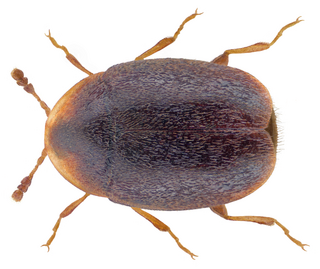
Corylophidae is a family of minute hooded beetles, sometimes called minute fungus beetles, in the order Coleoptera. There are about 18 genera and at least 120 described species in Corylophidae.

Technomyrmex albipes, commonly known as the white-footed ant, is a species of ant first described in 1861 from Sulawesi, Indonesia by the British entomologist Frederick Smith. Invasive pest ants in Florida, previously identified as T. albipes, have now been separated as Technomyrmex difficilis, both forming part of a species complex with a worldwide distribution.
Gnadochaeta is a genus of bristle flies in the family Tachinidae. There are at least 30 described species in Gnadochaeta.
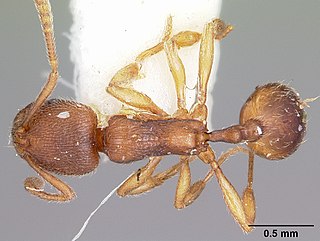
Stenamma impar is a species of ant in the family Formicidae.
Barinus is a genus of flower weevils in the family Curculionidae. There are about 14 described species in Barinus.
Osorius is a genus of unmargined rove beetles in the family Staphylinidae. There are about nine described species in Osorius.

Crematogaster lineolata is a species of ant in the family Formicidae.

Pogonomyrmex bigbendensis is a species of ant in the family Formicidae.

Myrmica americana is a species of ant in the family Myrmicinae. It can be found in all states in the U.S.A. besides Alaska, Hawaii, Oklahoma, Oregon, and Washington. It can also be found in all Canadian provinces besides New Brunswick, Yukon Territory, Northwest Territories, and Nunavut.

Odontomachus clarus is a species of ant in the family Formicidae.
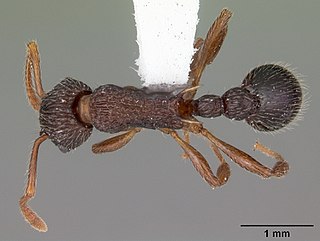
Myrmica punctiventris is a species of ant in the family Formicidae.

Trachymyrmex turrifex, the fungus farming ant, is a species of higher myrmicine in the family Formicidae.

Pogonomyrmex anzensis, the Anza desert harvester, is a species of ant in the family Formicidae.

Odontomachus relictus is a species of ant in the family Formicidae.

Pseudomethoca is a genus of velvet ants in the family Mutillidae. There are at least 20 described species in Pseudomethoca.

Temnothorax gallae is a species of ant in the family Formicidae.
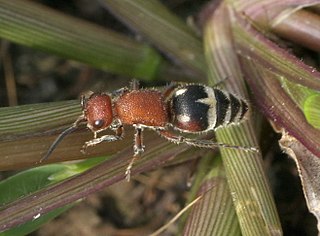
Timulla is a genus of velvet ants in the family Mutillidae. There are at least 20 described species in Timulla.
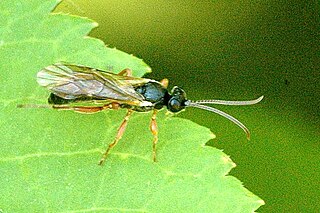
Triclistus pallipes is a species of ichneumon wasp in the family Ichneumonidae.

Ctenistini is a tribe of ant-loving beetles in the family Staphylinidae. There are at least four genera and about six described species in Ctenistini.

















